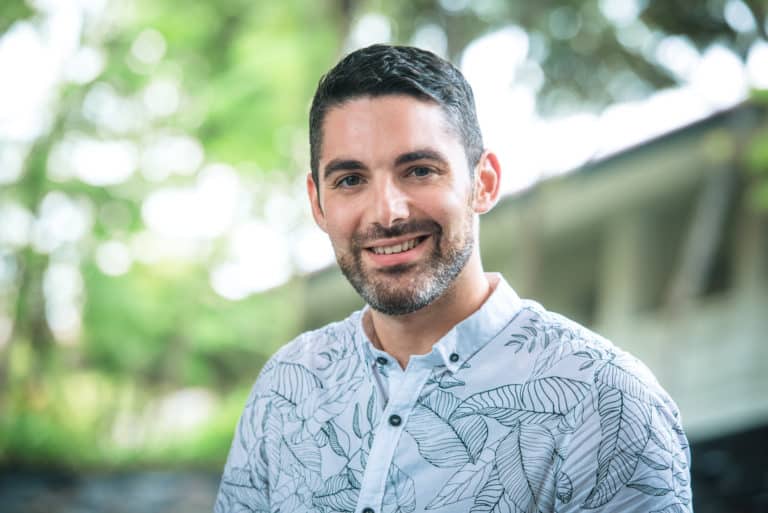
When Veli Aghdiran graduated from Cambridge in the depths of the 2008 crash, he wasn’t sure exactly what he did want to do, but he was at least clear about one thing: “I didn’t see myself staying in the UK.”
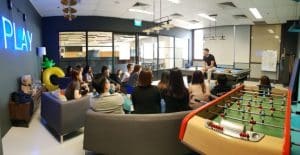 A decade later, as global vice-president of professional development for high-flying media agency Essence, he has found a career he loves – and, true to his original wish, he is based some 7,000 miles from London.
A decade later, as global vice-president of professional development for high-flying media agency Essence, he has found a career he loves – and, true to his original wish, he is based some 7,000 miles from London.
“I’ve spent the last two-and-a-half years living in Singapore, travelling between our nine Asia-Pacific offices, working with people from diverse cultures and backgrounds…I truly believe that if you can get or create the opportunity to work outside of your ‘home’ environment, you give yourself the chance to supercharge your learning and growth as a worker and as a human.”
Interviewed for the media and marketing news website, Mumbrella Asia, Veli (OE 1996–2003) reflects with great honesty on his time at QE: “The first three years were all about being top of the class. I was not one of the cool kids who did their homework on the bus on the way into school. The next three years were all about minimising the amount of time I had to spend doing work so that I could spend more time awkwardly trying to be cool and annoying my parents.
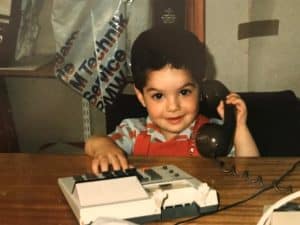 “North London is an ethnically diverse community and my school truly reflected its diversity. I appreciate the fact that I grew up in an environment where, by and large, diversity was celebrated and embraced. That may be part of what drew me to the study of languages – growing up speaking Turkish, English and a tiny bit of Greek, then learning French and Russian at school.” [Veli is pictured here as a child.]
“North London is an ethnically diverse community and my school truly reflected its diversity. I appreciate the fact that I grew up in an environment where, by and large, diversity was celebrated and embraced. That may be part of what drew me to the study of languages – growing up speaking Turkish, English and a tiny bit of Greek, then learning French and Russian at school.” [Veli is pictured here as a child.]
“I had the opportunity to go to Russia on a School trip in the late 1990s. A group of 20 of us headed to Moscow and St Petersburg. My mind was opened up to the reality that the way life and society worked in my corner of North London was not necessarily the way it worked everywhere else. I’m grateful to have had the opportunity to understand that at a young age.”
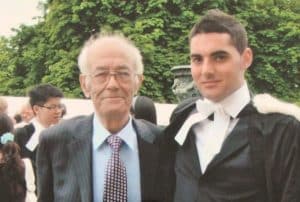 His love for languages and literature took him to Cambridge, where, from 2004–2008, he read Modern and Mediaeval Languages (Russian and French). The picture shows him on graduation day with his grandfather.
His love for languages and literature took him to Cambridge, where, from 2004–2008, he read Modern and Mediaeval Languages (Russian and French). The picture shows him on graduation day with his grandfather.
“After I graduated, the clear and defined path that I had been on through education suddenly came to an end. I wasn’t so much at a fork in the road as at a rake. I remember that feeling of not being entirely sure what a good next step would be, and also feeling like whatever path I took would define everything that happened thereafter. It’s interesting that we trap ourselves in these situations where we’re desperate to take action and move forward, and simultaneously frozen in the fear of the consequences – even if the impact of the decision is nowhere near as monumental as we make it feel in our heads and hearts.”
Eventually, he opted to start an online business with a close friend and, with the support of his parents, spent two years building it up. Then, as it suddenly dawned on the pair how much they would need to invest in marketing in order to generate significant revenue from the fledgling business, they realised that they both needed security and a proper salary.
He duly applied for a job with KidStart (the online shopping club that allows parents to save for their children as they shop), which was at that time a relatively new start-up. “Luckily I managed to convey some of that enthusiasm in my interviews, and I spent two great years at KidStart in a role that grew and expanded in lots of different directions, as did my confidence.”
Then came the break that would lead him eventually to his current position: “One of the founders at KidStart used to get invited to Shuffle, an event put on by what was then a small independent agency called Essence. He couldn’t make it one year and offered me his ticket.”
As the audience, who included many Essence staff, gathered at the upmarket venue — a Mayfair hotel – Veli says he remembers thinking that he would love to be part of this company. Six months later, following a “tough recruitment process” he was offered a job and, on starting with Essence in February 2013, he quickly found that his initial impression more than matched up to the reality: “In that first year, the agency I joined doubled in size around me and the excitement of being part of a growing, and successful, business was infectious.”
Towards the end of his first year, he was offered a role applying his industry knowledge and client experience in supporting the company. Although not without some hesitation – “there was, after all, growth for me on the client-facing side of things,” – he decided to take the plunge.
“Five years on, to say that I’m glad to have had the opportunity to move into ‘learning and development’ is an understatement. I’m proud of the work we do as a team and the impact we have on the business, and I’m excited about how we can do, and be, even better. The intellectual challenge of trying to build meaningful and effective learning experiences off and on the job is one that continues to motivate me, and is pertinent for every organisation.”
His personal and professional development has been incremental, although he recalls one “real growth spurt” when he and a colleague found themselves on the stage of a theatre facilitating a session on Essence’s new organisational operating model to the company’s entire New York office: “I was so far out of my comfort zone and went with it, appreciative of the fact that [she] and I got to do this crazy thing together.”
He has similar feelings about his time in Singapore: “Moving here with my wife, exploring a continent together… leading a team of smart and diverse people, learning from and working with a wide array of seasoned leaders have been all ‘the right kinds of challenging’.”
Among the lessons he has learned himself, he highlights:
- The importance as a leader of getting out of his team’s way. “When you’re surrounded by brilliant and smart people, you can waste a lot of time trying to show them that you’re even more brilliant and smart.”
- Finding good listeners who will resist the urge to fix your problems and will allow you to articulate your own thoughts, and thus to learn and to grow.
- Remembering in moments of self-doubt that you have felt like this before and “when you do, it usually means you’re on the verge of something amazing”.
- Stating your intentions, rather than hoping other people will guess what you mean.
- “If you’re unhappy with something or someone, no matter how sure you are that it’s all their fault, ask yourself on what level you might be creating this situation, and what you could do differently instead.”
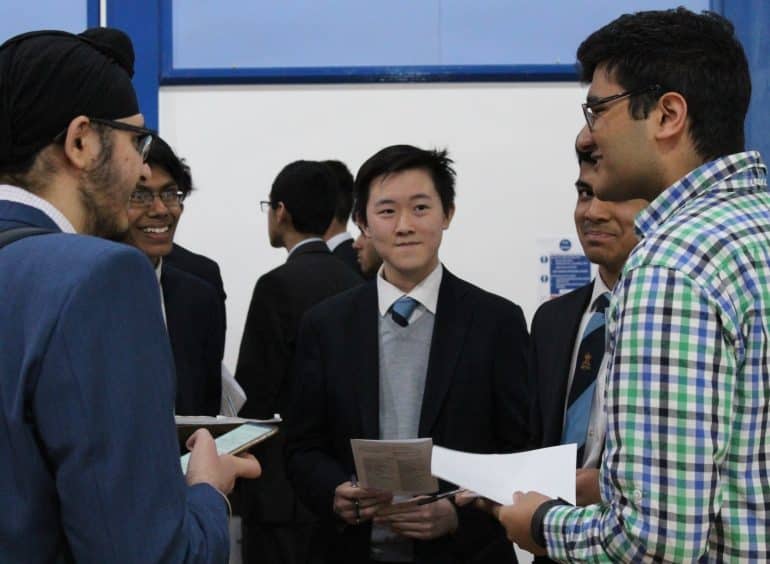
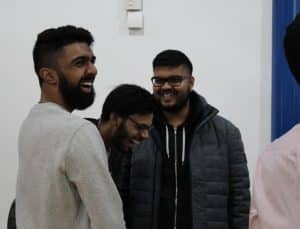 With fresh experience of university life, and with the Sixth Form and university application process such a recent memory, they were well-placed to give some first-hand advice to current Year 12 pupils.
With fresh experience of university life, and with the Sixth Form and university application process such a recent memory, they were well-placed to give some first-hand advice to current Year 12 pupils.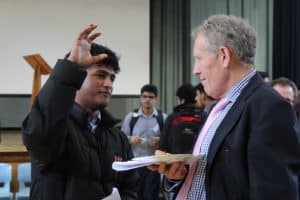 “Staff always enjoy the opportunity to hear how these recent leavers are getting on – even if it can sometimes be hard to recognise some, with their ‘civilian’ clothes, beards and new, non-QE-approved hairstyles!”
“Staff always enjoy the opportunity to hear how these recent leavers are getting on – even if it can sometimes be hard to recognise some, with their ‘civilian’ clothes, beards and new, non-QE-approved hairstyles!”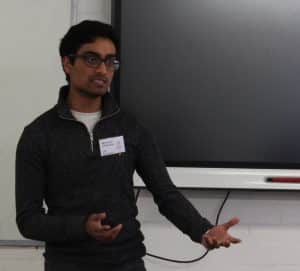 The Year 12 boys were encouraged to be quite specific with their questions to the alumni, asking, for example whether there was anything the students wished someone had told them before they applied.
The Year 12 boys were encouraged to be quite specific with their questions to the alumni, asking, for example whether there was anything the students wished someone had told them before they applied.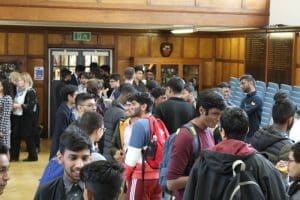 pursue after university, or what other paths they might want to take upon leaving the School.
pursue after university, or what other paths they might want to take upon leaving the School.
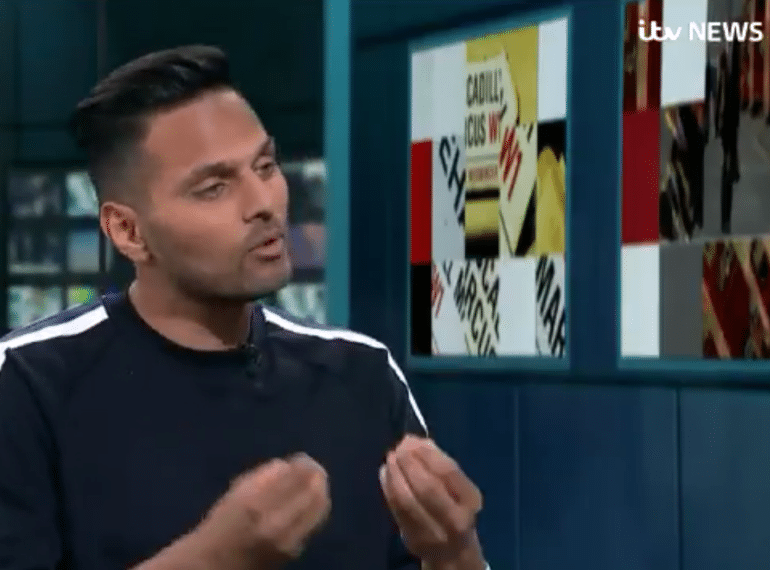
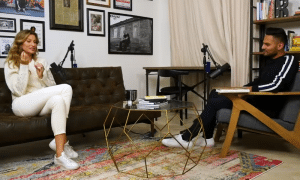 llenges – they were getting stressed out [because of] anxiety, mental health…What I try and do is use social media in a way that people can turn to it as a guide, as a way of thinking about their thoughts, how to improve their relationships, how to improve their careers…and how they can find meaning in their life.”
llenges – they were getting stressed out [because of] anxiety, mental health…What I try and do is use social media in a way that people can turn to it as a guide, as a way of thinking about their thoughts, how to improve their relationships, how to improve their careers…and how they can find meaning in their life.”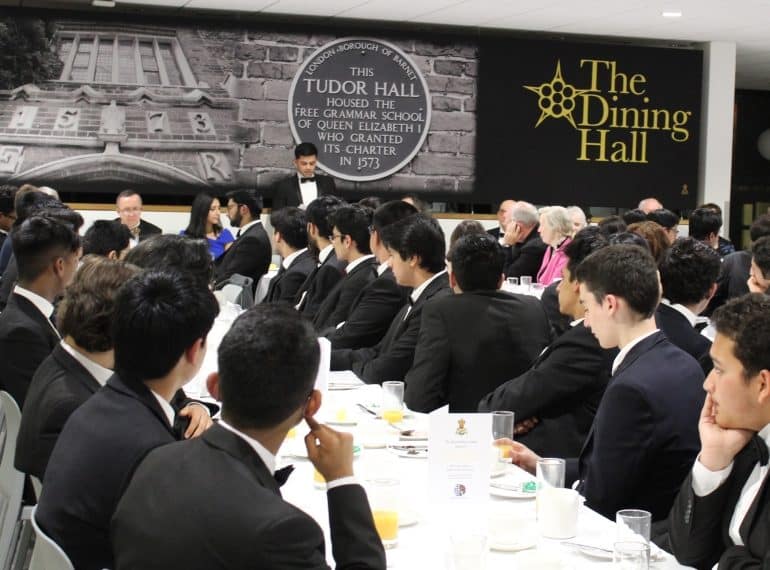
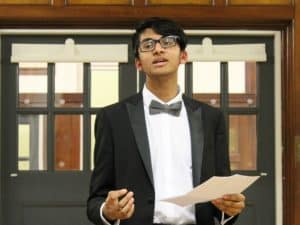 More than 170 guests, including Old Elizabethans, Year 12 pupils and staff, attended the 54th Elizabethan Union Annual Dinner Debate. The debate is a formal event which helps sixth-formers prepare for similar occasions at university and, later, in their professional lives.
More than 170 guests, including Old Elizabethans, Year 12 pupils and staff, attended the 54th Elizabethan Union Annual Dinner Debate. The debate is a formal event which helps sixth-formers prepare for similar occasions at university and, later, in their professional lives.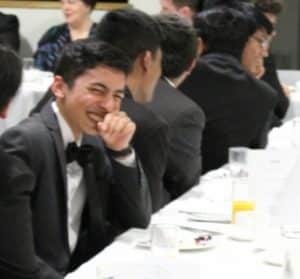 Headmaster Neil Enright said: “This was an enjoyable occasion, with some adroitly made arguments on both sides and contributions in the floor debate that were both enthusiastic and well-considered. I am grateful to the visiting alumni, including our guest speaker, Nikhil Patel.”
Headmaster Neil Enright said: “This was an enjoyable occasion, with some adroitly made arguments on both sides and contributions in the floor debate that were both enthusiastic and well-considered. I am grateful to the visiting alumni, including our guest speaker, Nikhil Patel.”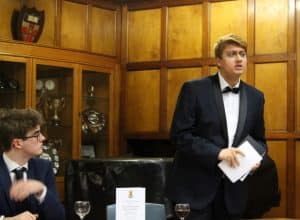 the electorate’s greatest concerns were not always based upon real evidence – a problem they blamed on media distortion.
the electorate’s greatest concerns were not always based upon real evidence – a problem they blamed on media distortion.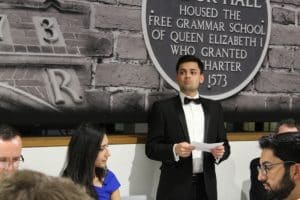 The motion was opposed by Ashwin Sharma (OE 2008–2015) and by Year 12 boy Alex Beard (replacing old boy Jason Thomas [OE 2010–2015], who was unable to attend).
The motion was opposed by Ashwin Sharma (OE 2008–2015) and by Year 12 boy Alex Beard (replacing old boy Jason Thomas [OE 2010–2015], who was unable to attend).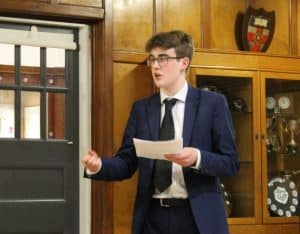 countries not typically classed as democracies. Democracy is more than just elections, they pointed out, stating that the very fact that the Elizabethan Union Dinner Debate was taking place was itself evidence of a functioning democracy.
countries not typically classed as democracies. Democracy is more than just elections, they pointed out, stating that the very fact that the Elizabethan Union Dinner Debate was taking place was itself evidence of a functioning democracy.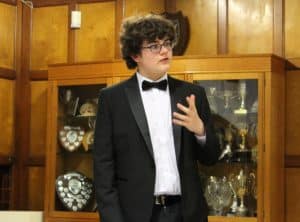 They should pursue things about which they are “truly passionate”, he said, before espousing the power and value of friendship: “…always remember your roots and who was with you on this journey when it all started.
They should pursue things about which they are “truly passionate”, he said, before espousing the power and value of friendship: “…always remember your roots and who was with you on this journey when it all started.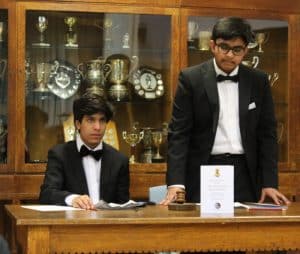 Nikhil finished his address with a toast to the Elizabethan Union. Current School Captain Bhiramah Rammanohar proposed a toast to ‘The Visitors’, while there were also the customary toasts to ‘Her Majesty, the Queen’ and to ‘The Pious Memory of Queen Elizabeth I’. Year 12 pupil Viraj Mehta chaired the debate.
Nikhil finished his address with a toast to the Elizabethan Union. Current School Captain Bhiramah Rammanohar proposed a toast to ‘The Visitors’, while there were also the customary toasts to ‘Her Majesty, the Queen’ and to ‘The Pious Memory of Queen Elizabeth I’. Year 12 pupil Viraj Mehta chaired the debate.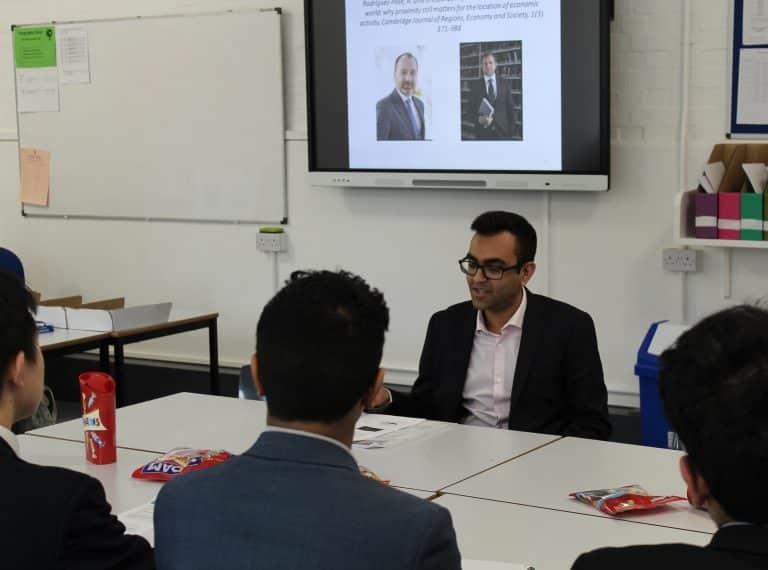
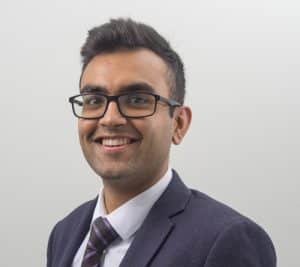 Hemang Hirani (OE 2008-15), who studied Geography and Economics at the London School of Economics and is now working for Barclays, gave a presentation to the select group of Year 12 geographers entitled The role of cities: an introduction to the field of Economic Geography.
Hemang Hirani (OE 2008-15), who studied Geography and Economics at the London School of Economics and is now working for Barclays, gave a presentation to the select group of Year 12 geographers entitled The role of cities: an introduction to the field of Economic Geography. coded maps of the USA and India depicting the importance of cities in both advanced and emerging economies.
coded maps of the USA and India depicting the importance of cities in both advanced and emerging economies.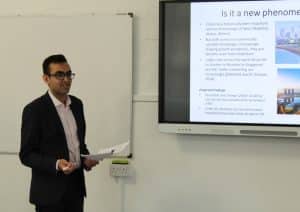 In his own time in the Sixth Form at QE, Hemang was a Senior Vice Captain. He has previously been involved in helping QE’s sixth-formers apply for Geography places at university.
In his own time in the Sixth Form at QE, Hemang was a Senior Vice Captain. He has previously been involved in helping QE’s sixth-formers apply for Geography places at university.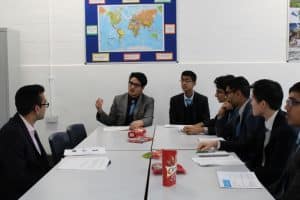 After graduating, he undertook a number of internships, including three months with Swiss investment bank and financial services company UBS as a Summer Analyst. He joined Barclays Private Bank in a similar role in June last year.
After graduating, he undertook a number of internships, including three months with Swiss investment bank and financial services company UBS as a Summer Analyst. He joined Barclays Private Bank in a similar role in June last year.
 A decade later, as global vice-president of professional development for high-flying media agency Essence, he has found a career he loves – and, true to his original wish, he is based some 7,000 miles from London.
A decade later, as global vice-president of professional development for high-flying media agency Essence, he has found a career he loves – and, true to his original wish, he is based some 7,000 miles from London. “North London is an ethnically diverse community and my school truly reflected its diversity. I appreciate the fact that I grew up in an environment where, by and large, diversity was celebrated and embraced. That may be part of what drew me to the study of languages – growing up speaking Turkish, English and a tiny bit of Greek, then learning French and Russian at school.” [Veli is pictured here as a child.]
“North London is an ethnically diverse community and my school truly reflected its diversity. I appreciate the fact that I grew up in an environment where, by and large, diversity was celebrated and embraced. That may be part of what drew me to the study of languages – growing up speaking Turkish, English and a tiny bit of Greek, then learning French and Russian at school.” [Veli is pictured here as a child.] His love for languages and literature took him to Cambridge, where, from 2004–2008, he read Modern and Mediaeval Languages (Russian and French). The picture shows him on graduation day with his grandfather.
His love for languages and literature took him to Cambridge, where, from 2004–2008, he read Modern and Mediaeval Languages (Russian and French). The picture shows him on graduation day with his grandfather.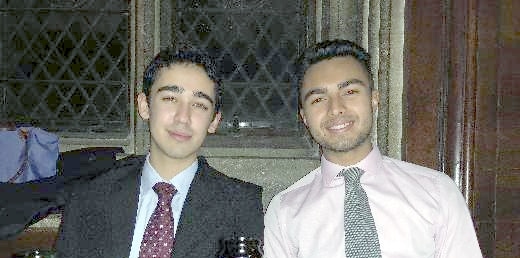
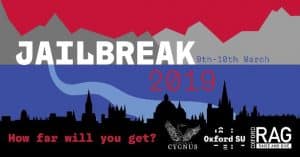 On their fundraising page, the pair state: “We will be hitchhiking, charming, and busking (?!) our way on to boats, trains and planes in our effort to beat the other teams and escape from Oxford! Rohan will use his excellent interpersonal skills and awkward humour along the way and Conor will contribute rusty French, rudimentary German, and a healthy dose of positivity. We have never attempted anything like this before and are excited to give it a crack.”
On their fundraising page, the pair state: “We will be hitchhiking, charming, and busking (?!) our way on to boats, trains and planes in our effort to beat the other teams and escape from Oxford! Rohan will use his excellent interpersonal skills and awkward humour along the way and Conor will contribute rusty French, rudimentary German, and a healthy dose of positivity. We have never attempted anything like this before and are excited to give it a crack.”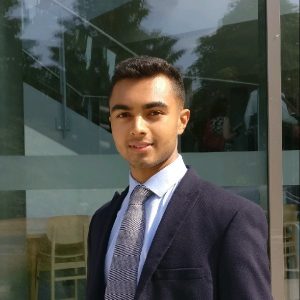 Society this term and has invited young historians from QE along to hear outspoken historian David Starkey deliver a talk in March.
Society this term and has invited young historians from QE along to hear outspoken historian David Starkey deliver a talk in March.